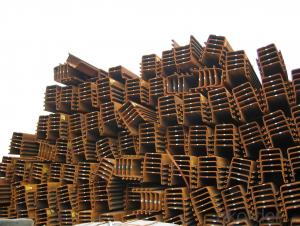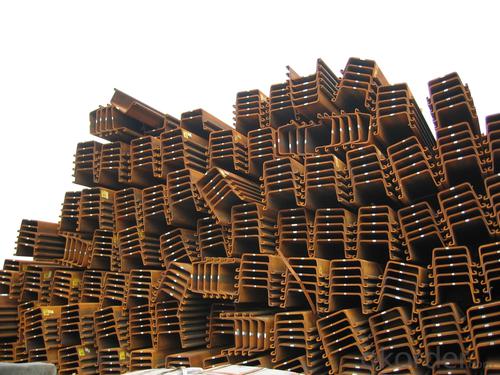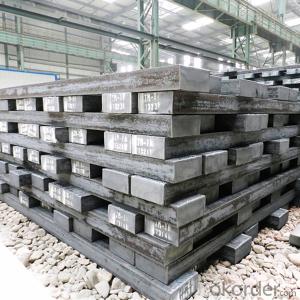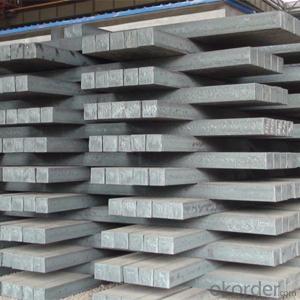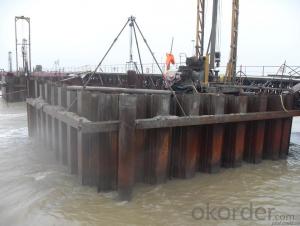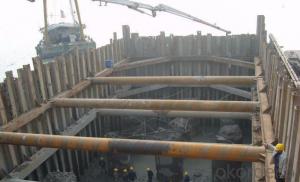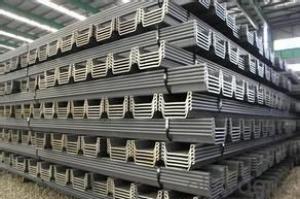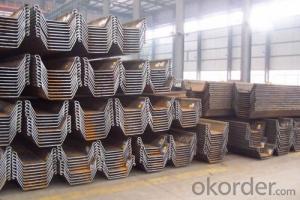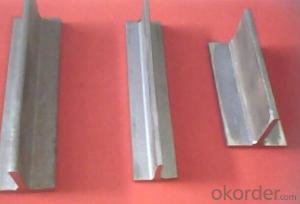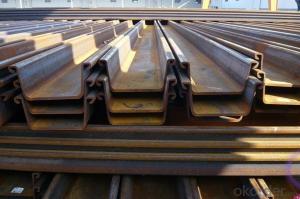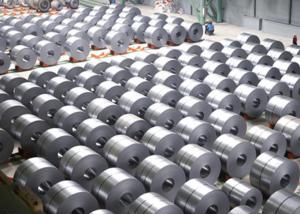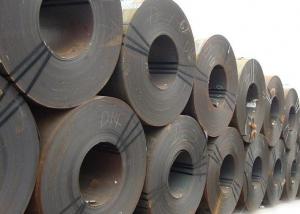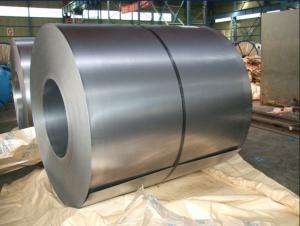Steel Tubular Pile 1200mm
- Loading Port:
- China Main Port
- Payment Terms:
- TT OR LC
- Min Order Qty:
- -
- Supply Capability:
- -
OKorder Service Pledge
Quality Product, Order Online Tracking, Timely Delivery
OKorder Financial Service
Credit Rating, Credit Services, Credit Purchasing
You Might Also Like
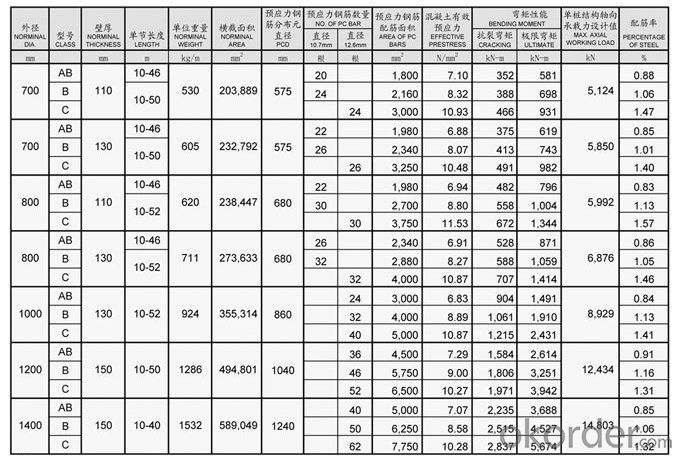
- Q: How is steel used in the manufacturing of mining equipment?
- Steel is commonly used in the manufacturing of mining equipment due to its exceptional strength and durability. It is used to construct various components such as drill bits, shovels, extraction machinery, and crushing equipment. Additionally, steel is preferred for its resistance to wear and corrosion, making it ideal for withstanding the harsh conditions often encountered in mining operations.
- Q: How is steel mesh used in construction?
- Steel mesh is commonly used in construction for reinforcing concrete structures. It is placed within the concrete to provide additional strength and prevent cracking or failure. The mesh helps distribute the load evenly, making the structure more durable and resistant to various forces such as tension and compression. Additionally, it can be used in constructing fences, partitions, or as a safety barrier.
- Q: How is steel used in the production of electrical transformers?
- Steel is used in the production of electrical transformers to provide structural support and magnetic properties necessary for efficient power transmission. It forms the core of the transformer, allowing the magnetic field to be created and transferred to the secondary winding, enabling the transformation of electrical energy.
- Q: What are the different grades of steel used in various industries?
- There are several different grades of steel used in various industries, each with its own unique properties and characteristics. Some common grades include carbon steel, stainless steel, alloy steel, and tool steel. Carbon steel is widely used due to its strength and affordability, while stainless steel is corrosion-resistant and often used in the food and medical industries. Alloy steel is known for its high strength and durability, making it suitable for construction and automotive applications. Tool steel is specifically designed to withstand high temperatures and pressures, making it ideal for cutting and shaping tools.
- Q: How is steel tubing used in heat exchangers?
- Steel tubing is commonly used in heat exchangers due to its excellent thermal conductivity and durability. It is employed to create the primary heat transfer surface within the heat exchanger, allowing efficient transfer of heat from one fluid to another. The steel tubing's high strength and resistance to corrosion ensure the heat exchanger's longevity and reliability, making it a preferred choice in various industrial applications.
- Q: What are the uses of steel wire mesh in filtration?
- Steel wire mesh is commonly used in filtration systems due to its durability and strength. It is widely utilized in various industries, including wastewater treatment, oil and gas, mining, and food processing. The mesh provides an effective barrier to separate solids from liquids or gases, ensuring the removal of contaminants and impurities. Moreover, its high tensile strength allows for efficient filtration without compromising the flow rate. The versatility of steel wire mesh makes it an ideal choice for applications requiring reliable filtration, such as sieving, dewatering, and particle separation.
- Q: How are steel sheets used in the automotive industry?
- Steel sheets are used in the automotive industry for various purposes such as body panels, structural components, and reinforcement. They provide strength, durability, and crash resistance to vehicles, ensuring safety and longevity.
- Q: What are the advantages of using steel in roofing materials?
- There are several advantages of using steel in roofing materials. Firstly, steel is a highly durable material that can withstand extreme weather conditions, such as strong winds, heavy rains, and even hailstorms. It is also resistant to fire, making it a safe choice for roofing. Additionally, steel roofs are known for their longevity, as they can last for several decades with minimal maintenance. Moreover, steel is lightweight, which makes it easier and more cost-effective to install. Lastly, steel roofs are environmentally friendly as they are often made from recycled materials and can be recycled themselves at the end of their lifespan.
- Q: What are the different types of steel tanks and their applications in the food processing industry?
- There are several types of steel tanks used in the food processing industry, including stainless steel tanks, carbon steel tanks, and alloy steel tanks. Stainless steel tanks are the most common type, known for their corrosion resistance and hygienic properties. They are widely used for storing and processing various food products such as dairy, beverages, sauces, and oils. Carbon steel tanks, on the other hand, are less expensive but require additional measures to prevent corrosion. They are commonly used for bulk storage of dry food ingredients like grains, flour, and sugar. Alloy steel tanks are a specialized type that offers enhanced strength and durability. They are utilized in food processing applications that involve high-pressure processes or extreme temperature conditions, such as canning or sterilization. Overall, steel tanks play a crucial role in the food processing industry, ensuring proper storage, transportation, and processing of food products while maintaining hygiene and safety standards.
- Q: What are the different types of steel sheets and their uses in the construction of prefabricated buildings?
- There are several types of steel sheets used in the construction of prefabricated buildings. One common type is hot-rolled steel sheets, which are known for their strength and durability. These sheets are often used in the construction of structural components such as beams, columns, and trusses. Another type is cold-rolled steel sheets, which are typically thinner and more precise in dimension. They are commonly used for cladding and roofing purposes. Galvanized steel sheets are coated with a layer of zinc to enhance their resistance to corrosion, making them suitable for outdoor applications. Lastly, stainless steel sheets are highly resistant to rust and corrosion, making them ideal for areas with high moisture or chemical exposure. These sheets are often used in kitchens, bathrooms, and other areas that require a hygienic and durable surface. Overall, the different types of steel sheets serve various purposes in the construction of prefabricated buildings, ensuring structural integrity, durability, and aesthetics.
Send your message to us
Steel Tubular Pile 1200mm
- Loading Port:
- China Main Port
- Payment Terms:
- TT OR LC
- Min Order Qty:
- -
- Supply Capability:
- -
OKorder Service Pledge
Quality Product, Order Online Tracking, Timely Delivery
OKorder Financial Service
Credit Rating, Credit Services, Credit Purchasing
Similar products
Hot products
Hot Searches
Related keywords
